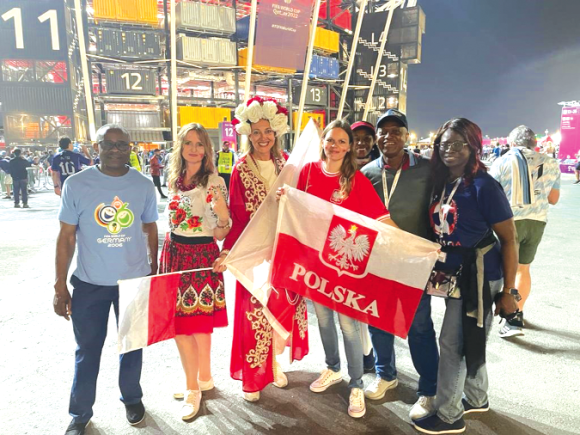
Qatar: A Dose of soccer and tourism
In last week’s account where I narrated the taste of our first World Cup match which was between Spain and Germany and also the lovely stadium which had attached a 5-star hotel, the metro and fans from other countries, I sauntered into the issue of human rights abuses I had heard was prevalent in the country, when I met an immigrant who gave his name as Bashir. This is what he told me…
According to him, his contract with the government allowed him to go home on leave every two years for 45 days at a time. Bashir who was married with one child was however not allowed to bring his family to join him in Qatar unlike highly placed immigrant workers such as Doctors, Engineers and Consultants.
Although I equally ran into other migrant workers from Ghana and Nigeria during my stay, apart from the perfunctorily greetings, it was difficult to engage them in any worthwhile discussions due to time constraints.
Perhaps my most interesting match was the Poland/Argentina match which took place at Stadium 947 in Ras Abu Aboud, about 10 kilometres from central Doha.
The stadium which derived its name from the fact that it was constructed entirely from 947 shipping containers and modular steel, is the first fully demountable covered football stadium.
Interestingly, 974 is also the international dialling code for Qatar.
Situated in the portside area and in sight of Doha’s coastal cityscape, we were assured that the cool breeze from the Arabian Gulf will soothe our nerves during the expectedly pulsating match between Argentina and Poland.
I was also informed that after the football tournament, the containers and super-structure will be reused to build a waterfront local community as well as a dynamic hub of business.
Early departure
In view of the very important match, we departed our residential abode for the stadium at 7 p.m. for the 10p.m. match. On our arrival, the atmosphere outside the stadium was already exhilarating as the highly boisterous Argentina army of supporters, dressed in their traditional white and blue attire, belted out the lyrics of their famous football chants.
Matters were more intense inside the stadium with the Argentine fans who mostly donned the number 10 jersey of their talismanic star, Lionel Messi, continued their rhythmical singing, incessant drumming and trance-like ferocity. As they sang and danced, the stadium stands shook so violently that for once, I thought that the whole edifice would collapse under their weight.
When I enquired why so many Argentine fans were able to come all the way to Qatar, I was informed that the mammoth Argentina crowd had been swelled by about 5,000 Argentines who worked and lived in Qatar.
In addition, it is believed that apart from a long history of football tradition, the sport had become the glue that held the country with a very deep political fissure and near comatose economy together.
Lionel Messi, undoubtedly the current king of football in the modern era, was the god of Argentina fans. Even after losing a penalty at the 38th minute, “La Pulga’’ (little flea) as the diminutive player is nicknamed, was always hailed with deafening sounds of the Argentina fans as he continued his dribbling skills and tricks on the field.
The fans were so boisterous that my group decided to leave the stadium about 10 minutes before the end of the match which Argentina won, a prelude to the country’s final victory during the World cup final against France.
Limited
In view of Qatar’s status as a newly emerging nation, the choice of places of tourist attraction in the oil rich country were limited.
These included but were not limited to waterfront views, sandy beaches, museums and the Souq Waqif market. This was unlike the 2018 World Cup in Russia where we feasted on a galaxy of iconic historical places of interest, outdoor restaurants, festive fan centres, as well as all-night parties for those interested.
Drinking alcohol before, during and after soccer matches is a habit loved by many supporters around the world.
But at Qatar 2022, alcohol was not as readily available. That’s because two days before the start of the 2022 tournament, soccer’s world governing body, FIFA, confirmed a ban on alcoholic beverages at the eight stadiums hosting the World Cup.
To be continued
